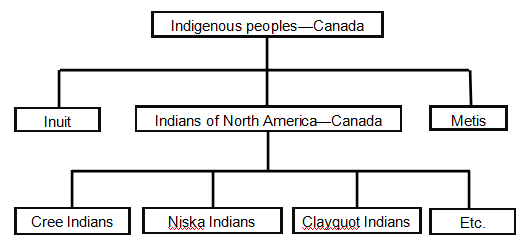In 2016 the Musqueam First Nation, on whose unceded traditional territory Langara is located, gave Langara a Musqueam name that means house of teachings. As part of Langara’s commitment to strengthen the connections between the Musqueam people and the College, our librarians began thinking about ways the library can better participate in decolonization by acknowledging the history of colonization and resituating the traditions and values of indigenous peoples outside of a colonial ideology. Similarly, across Canada, librarians have begun wrestling with a colonial legacy that exists in our collections and catalogs.
One of the ways a colonial past affects library collections is the way Indigenous subject matter is described in our catalog. One of the library’s key functions is to organize information so that it’s findable. This is accomplished through the related tasks of classification and description, where information is labeled using an index of proscribed terminology, known as “controlled vocabulary.” The Langara Library uses the standard academic controlled vocabulary known as the Library of Congress Subject Headings (LCSH), as well as the controlled vocabulary maintained by the Library and Archives of Canada.
It is now generally acknowledged within both the international and the Canadian library communities that the language the LCSH uses to describe Indigenous peoples is often archaic and inappropriate. Work has begun to correct this problem, for example within the Canadian Federation of Library Associations (CFLA) Indigenous Matters Committee, who is working to “address issues related to libraries, archives and cultural memory institutions; to promote initiatives in all types of libraries by advancing and implementing meaningful reconciliation as addressed by the Truth and Reconciliation Commission report and in the Calls to Action.”
While the Truth and Reconciliation Commission of Canada has identified several “calls to action” that are relevant to libraries, the issue of decolonizing library description has become a pressing issue for libraries across Canada, including the Langara Library. Following the lead of the CFLA Indigenous Matters Committee, the Langara Library is committed to “acknowledging the structural biases and inadequacies in existing schemes of knowledge organization and information retrieval arising from colonialism, [and] adopting an ethic based upon the commitment to integrating Indigenous and Western knowledges into access, arrangement, description, classification and cataloguing praxis ”
This task of thoughtfully integrating Indigenous and Western knowledges is perhaps best illustrated by the word, “Indian.” Currently, LCSH proscribes the subject heading “Indians of North America—Canada,” which is a narrower term of the subject heading “Indigenous peoples—Canada,” and a broader term of smaller groups, such as “Cree Indians.”
The Library of Congress’ Classification Web illustrates this hierarchy as follows:
This semantic structure may also be visualized as a web:

Although there is some debate over preferred terminology, it would be a move in the right direction to replace “Indians of North America” with “First Nations” and remove the term “Indians” from specific nations.
This, however, is one of hundreds of possible changes that might advance the cause of decolonizing description. Many similar potential changes have been identified by the Association for Manitoba Archives, who reviewed Indigenous subject heading initiatives underway, including work done here in British Columbia at the Xwi7xwa Library, and developed a subject authority list that attempts to address colonial issues while adhering to the structure of LCSH, allowing for integration into existing database structures.
Terminology suggested by the Association for Manitoba Archives includes such changes as “Indian authors” to “Indigenous authors” and “Inuit language” to “Inuit languages,” as well as deletions such as “Eskimos–Northwest Territories” and “Indians in music.”
Despite the work that has gone into re-evaluating the language used in the description of library materials, the authorities that maintain controlled vocabularies are yet to make substantive changes, partly because of the need for consultation with Indigenous groups, and the importance of getting revisions right the first time. Although Langara librarians have considered proactively making changes to our local library catalog, given that work is progressing on a national level, we are awaiting expected changes to the current system, which will eventually be enacted broadly.
In the meantime, Langara librarians continue to be involved directly with the CFLA-FCAB Cataloguing and Metadata Standards Committee, and will be attending an upcoming conference on decolonizing description here in Vancouver in early 2019.

